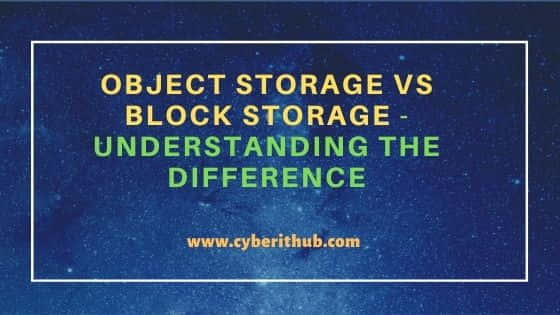Advertisements
In this article, we will look into the difference between object storage and block storage. I am sure you must have heard about the concept of object storage and block storage in multiple places. May be mostly in cloud environments. But do you how object storage is different from block storage ? Which storage you should choose when it comes to storing your data ? All these important questions needs to be answered before you actually start with the storage. Here we will try to understand the difference between the two so that you can make effective decisions about its usage.

Object Storage Vs Block Storage
Also Read: A Complete Guide to Setup Kubernetes Cluster on EC2 Instance Using Kops
Object Storage
- It is used for storing data in the form of objects.
- Data is stored in unstructured format.
- It provides Eventual Consistency.
- This storage cannot be used for installing any software or applications.
- It does not need to be attached to an Instance.
- It can be accessed from multiple sources like Internet, Instance etc.
- It can store unlimited amount of data.
- Object Storage is relatively cheaper.
- It provides slower performance in comparison to other storage types.
- It stores object with metadata information.
- Data can be quickly and easily searched and retrieved.
- Mostly recommended for backup and recovery.
- S3 is an object Storage Service in AWS. More about Amazon S3 service.
Block Storage
- It is used for storing data in the form of blocks.
- Data storage is highly structured.
- It provides Strong Consistency.
- This storage can be used for installing software and applications.
- It needs to be attached to an Instance.
- It can only be accessed only through an Instance where it is attached.
- It has limited storage capabilities.
- Block Storage is usually expensive.
- Usually provides higher performance depending on the region it is being used.
- It has limited metadata handling capabilities.
- Slower search and retrieval due to absence of metadata information.
- Mostly recommended for transactional Database Storage.
- EBS is a Block Storage Service in AWS. More about Amazon EBS Service.
